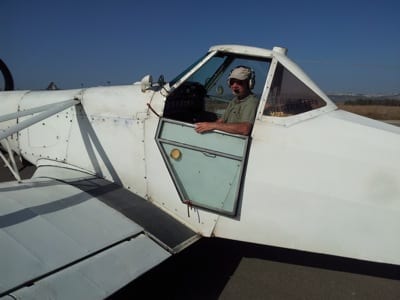Evidence of the continued worldwide expansion in the use of lead-free, ethanol-free mogas in general aviation comes from this report from Israel. Haim Zaklad, a private pilot there, recently requested details on our study of the FAA’s aircraft registry showing that over 80% of all piston engine aircraft could operate today on lead-free, ethanol-free mogas. He described the recent successful action by pilots in his country to gain approval of the Petersen mogas STCs from Israel’s Civil Aviation Authority:

“We are a group of flying clubs in Israel trying to make mogas available to the flying community. We were successful in convincing our CAA to accept Petersen’s STCs and have already purchased a few from Petersen. Israel’s CAA did not recognize the fact that many aviation engines can run on mogas and refused to allow its use. For three years we argued with the regulatory agency about the safety and efficacy of mogas (98 RON) used in aviation under STCs. We benefitted from the help of data from Todd Petersen, data from the FAA and other European regulatory agencies and, not the least, from supportive communications with officials of the FAA. Mogas in Israel does not contain ethanol but to be on the safe side, we also include in our QC program a test to rule out ethanol. Prior to approval, we had to demonstrate safety to our CAA under an approved flight program.”
“Finally we won approval: STCs from the U.S. are now accepted in Israel. Mogas can be used in all aircraft that have an STC. But the victory was not complete. There is a catch. All types of fuel used for aviation in Israel is exempted, by law, from the heavy excise tax (not sales tax), while fuels used in cars are heavily taxed. The pump price of gasoline at our gas stations (including tax) is more then double the price at the refinery (before applying excise tax). As a reference, the price for the same gas in Israel is about double US prices. The tax agencies decided that auto gasoline used for aviation should be taxed as autogas and tax free as avgas. We went to the Israeli Supreme Court seeking justice. We are now in the process of collecting evidence to support our position in front of this court.” In the U.S., highway fuel taxes are usually reimbursed to those who, like pilots, use the fuel for off-highway purposes.
Haim described sport aviation in Israel: “We have three active sport flying groups consisting of several hundred aircraft and several thousand pilots: AOPA Israel, Association of Ultralight Pilots and several gliding clubs. Our airspace is fully controlled so we fly CVFR, while Ultralights (LSA) are subject to different restrictions. Gliders enjoy relatively comfortable gliding zones during weekends under the watchful eye of the controllers. Since our airspace in Israel is limited, we often organize air rallies to various European countries, which always includes one overwater leg of 450 nm enroute to Rhodes, Greece.”
Haim’s flying activities consists of single-engine aircraft, gliders, motor glider as well as towing gliders in his club. He participated twice in FAI-World Rally Flying Championship (flying from Israel to Spain, and later, Slovakia in his Taifun 17E motorglider) and he enjoys mountain soaring in the French Alps.
Congratulations to Haim Zaklad and his fellow pilots for helping to make general aviation more affordable in Israel.
The GAfuels Blog is written by two private pilots concerned about the future availability of fuels for piston-engine aircraft: Dean Billing, Sisters, Ore., a pilot, homebuilder and expert on autogas and ethanol, and Kent Misegades, Cary, N.C., an aerospace engineer, aviation sales rep for U-Fuel, and president of EAA1114.
